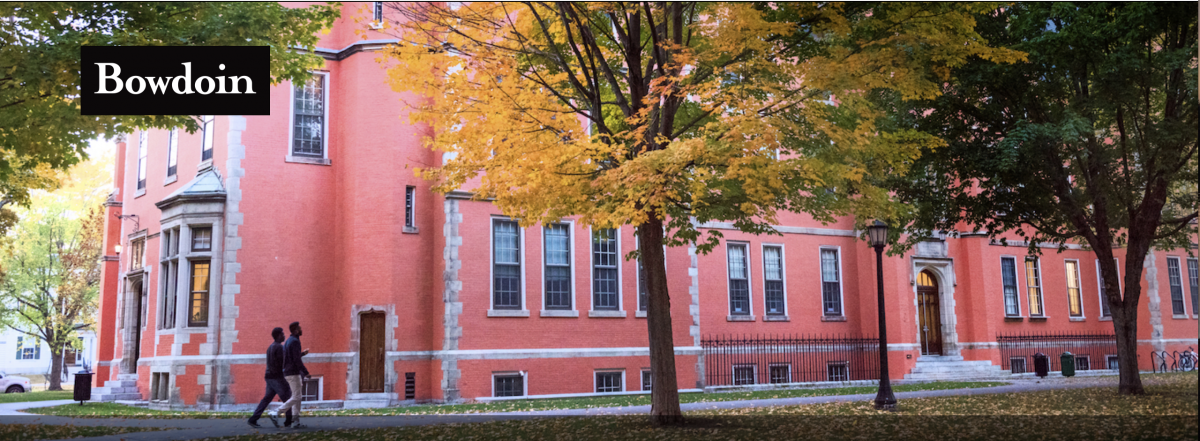- What data did you collect?/What is your initial impression of the data?In this log, I observed Bowdoin President Joseph McKeen’s address regarding the common good, which is as followed:
“It ought always to be remembered, that literary institutions are founded and endowed for the common good, and not for the private advantage of those who resort to them for education. It is not that they may be enabled to pass through life in an easy or reputable manner, but that their mental powers may be cultivated and improved for the benefit of society.” (McKeen, 1802)
I am particularly interested in what McKeen was saying in regards to the common good, and how Bowdoin, as a literary institution, should not be for private advantages and that “[the Bowdoin students] mental power may be cultivated and improved for the benefit of society”. Essentially, his argument is that college institutions, like Bowdoin, were founded for the common good, or the public good, and that those who graduate from Bowdoin would use their knowledge and intelligence for the improvement of society. Joseph McKeen wanted Bowdoin students to remind themselves that they should work to improve society, though it is predicated on the fact that getting into Bowdoin (especially at that time) has been limited to rich white males from the New England area. This reinforces white savior complex, along with the elitist and neoliberal mindset of the wealthy philanthropist.
I found an interesting article entitled “From Eternity to Here: Shrinkage in American Thinking About Higher Education” by Harpham, who makes an argument about how alumni who are philanthropists and donate money to their alma mater that is born from a “businessman’s capitalist and economist mindset”, or, a neoliberalist that believes in the individual’s ability to affect social change through money. He states, “Our paradigmatic but increasingly rare benefactor might be unaware that a long tradition of reflection has endorsed his decision to promote the common good by creating opportunities for individual enrichment… For Carnegie, it was the responsibility and the privilege of the private citizen to provide for the needs of society in perpetuity.” I find the rhetoric and argument very interesting and eerily similar to McKeen’s argument for the common good– in creating opportunities for individual success, and to implore the individual to improve the common good. The essential logic is as goes– go to college, be successful, and give back to the community after your success. I find a fallacy in this argument, as this promotion of the common good requires that the individual at first be successful–what if this individual does not become successful? What if this individual chooses not to give back or promote the common good? What if the individual’s idea of success is so absorbed by greed and a pursuit for more money that he/she never ends up giving back? Most importantly, even if the ideal type of a Bowdoin student exists and goes good, liberal arts colleges are incredibly exclusive in nature, and there are not many of them in the United States. Harpham concludes, “The prestige, wealth, and tuition of the top liberal arts colleges remind use of the fact that regardless of the high-minded idealism of the rhetoric of liberal education, the actually existing institutions that most faithfully embody that rhetoric exclude, stratify, and consolidate the status quo at least as often as they create opportunities for mobility.”
As such, in the process of promoting the Common Good, Bowdoin also subscribes to the conditions of stratification and inequality. Buying into this idea of the Common Good brings a peace of mind, reasoning, and virtue that the capitalist and neoliberalist can utilize to justify the moral arguments behind the actions of his/her work.
How have the data you have collected this week changed/progressed your thinking about your research project?
This data has helped me further develop my critique of the moral justification behind the neoliberal concepts as explored by Bowdoin. Harvey argues that neoliberalism needs a means of justifying its moral code, and this research has shown me how the Common Good is one prominent way in which Bowdoin alumni and the Board of Trustees rationalize the work they do despite the initial exclusivity of getting into Bowdoin.
What challenges did you encounter while collecting the data?
The difficult part was finding a research article that closely relates to McKeen’s idea of the Common Good, which I found to be pretty distinctive. However, with some luck and keywords, I was able to find just the article to support the argument that I was making.
What are your next steps?
My next steps are to move away from the philosophy of the school and look at the concrete examples of how Bowdoin subscribes to neoliberal practices. Now, I will look at West Trek, the Alumni Panel Session on the Liberal Arts Education, and newspaper clippings and articles regarding the liberal arts education.
2-3 annotations.
- McKeen, Joseph (1802) The Common Good. Bowdoin College, Retrieved from: https://www.bowdoin.edu/about/common-good/
- Harpham, Geoffrey Galt (2011) From Eternity to Here: Shrinkage in American Thinking About Higher Education. Representations 116(1): 42–61.
Skip to content
Research Portfolio
